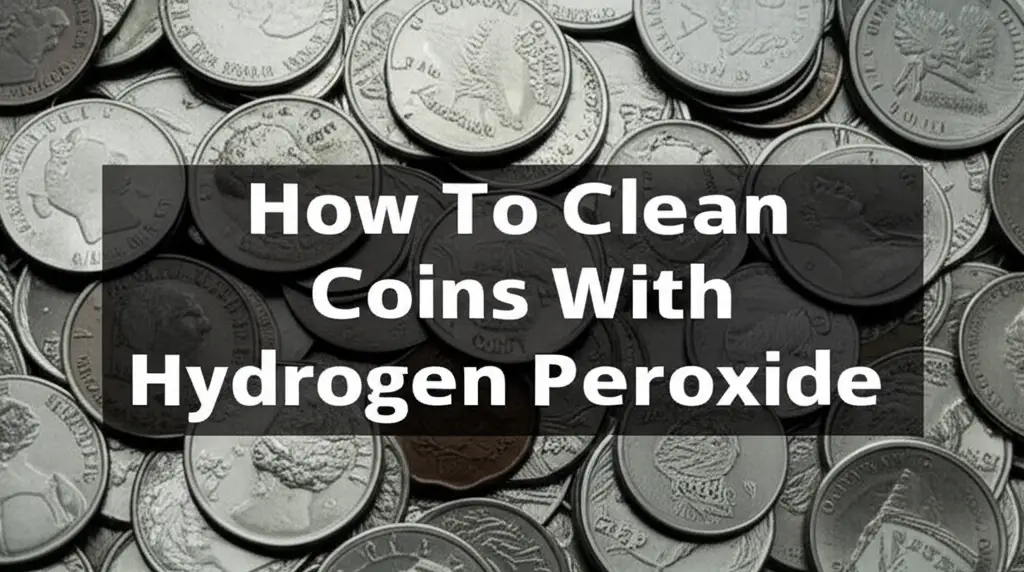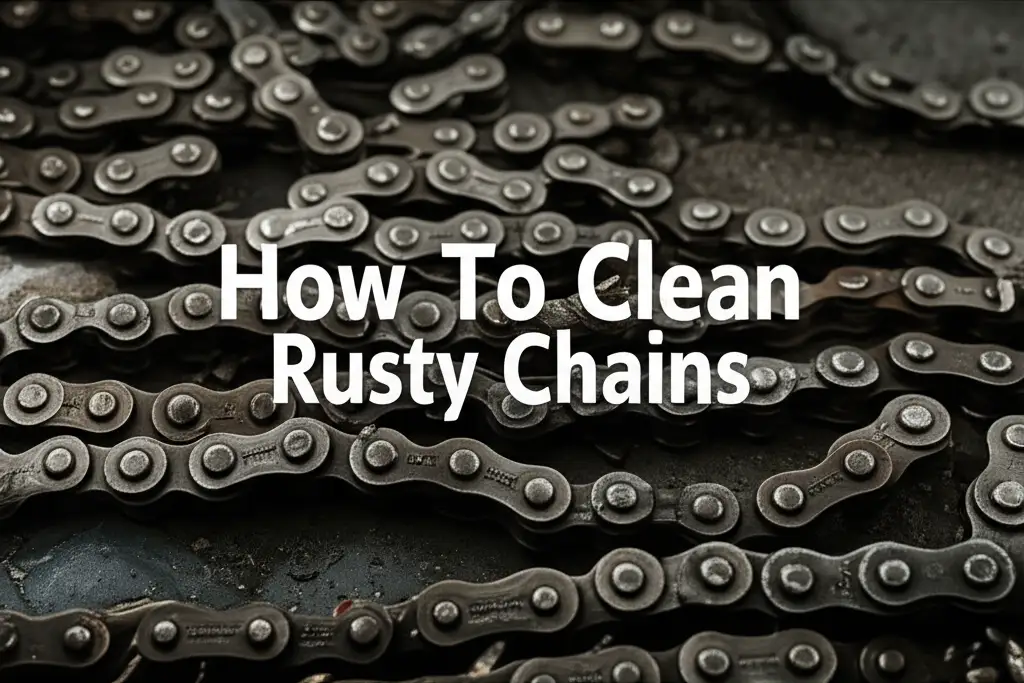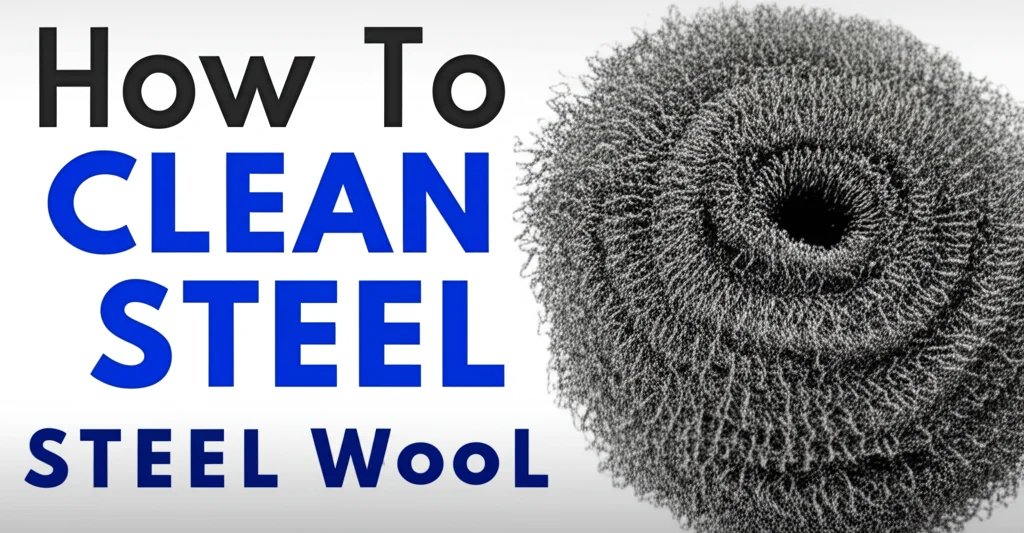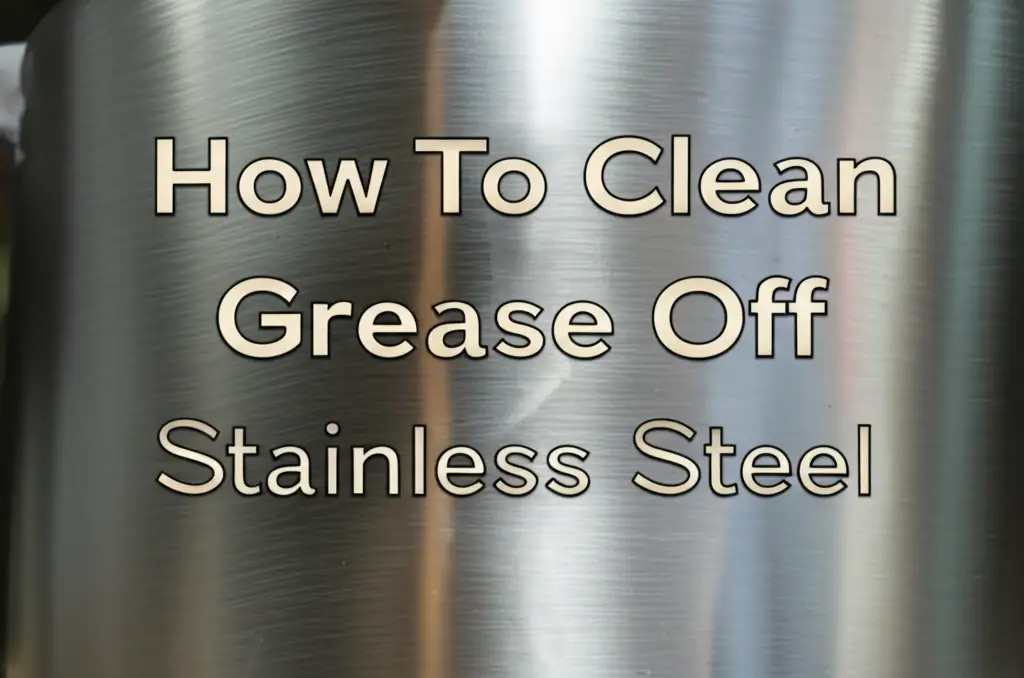· Cleaning Tips · 13 min read
How To Clean Rusty Coins
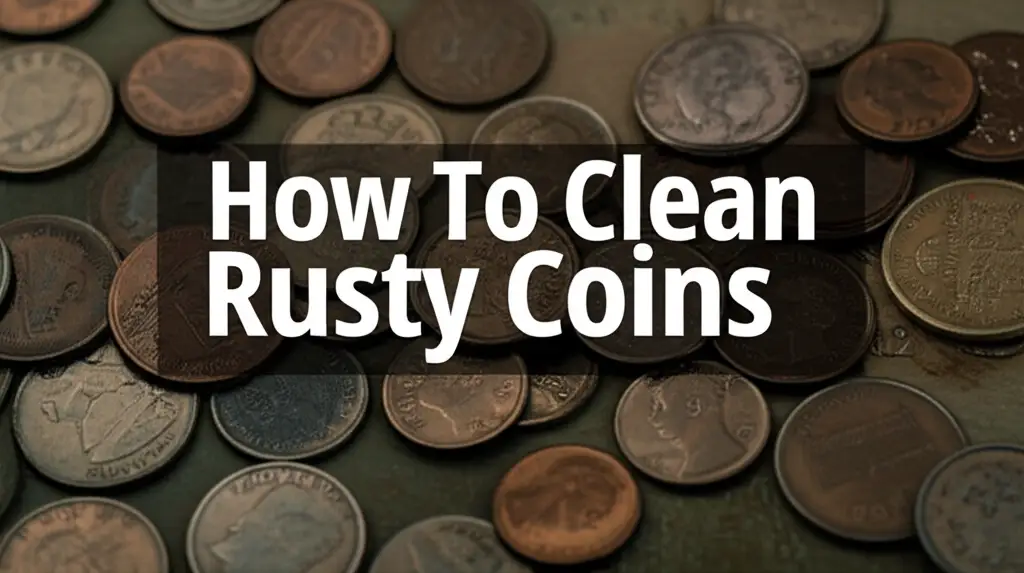
Restore Your Coins: How To Clean Rusty Coins Safely
Do you have old coins covered in rust? Finding a rusty coin can be exciting, but the rust hides its true beauty. You want to see the details, the date, and the history behind it. Many people wonder how to clean rusty coins without causing more harm.
Rust, a form of corrosion, can ruin a coin’s surface. Proper cleaning helps bring back its original look. It also makes the coin easier to identify and appreciate. In this guide, I will share safe and effective ways to clean these corroded treasures. We will cover gentle methods, stronger techniques, and important precautions. My aim is to help you clean your rusty coins without damaging them further.
Takeaway:
- Assess coin value before cleaning to avoid damage.
- Start with gentle methods like soap and water.
- Use mild acids like vinegar for stubborn rust.
- Always dry coins completely and store them properly.
- Never use harsh chemicals or abrasive tools.
Clear Answer:
To clean rusty coins, begin with gentle methods such as warm soapy water and a soft cloth for light rust. For stubborn corrosion, use mild acidic solutions like white vinegar or lemon juice, soaking the coin briefly before gently scrubbing. Always rinse and dry coins thoroughly to prevent new rust.
Understanding Rust on Coins: Why It Appears
Rust forms when iron or steel reacts with oxygen and water. This chemical process is called oxidation. Coins made from materials like iron, steel, or even certain alloys containing iron are prone to rusting. Most modern coins use metals like copper, nickel, or zinc, which corrode differently, but older or foreign coins might contain iron.
When rust appears on a coin, it forms a reddish-brown flaky layer. This layer eats away at the coin’s metal. It can hide important details like dates or mint marks. Over time, rust can permanently damage the coin’s surface. Understanding how rust forms helps you choose the right cleaning method. It also shows why quick action is often important for preserving your coins.
Coins left in damp environments are more likely to rust. Humidity, soil contact, or exposure to water speeds up this process. For instance, old coins found in the ground are often heavily rusted. The soil holds moisture, creating a perfect condition for rust to develop. Knowing the cause of the rust helps you decide on the best way to clean and protect your coin.
Before You Clean: Assessing Your Rusty Coins
Before you begin any cleaning process, it is important to assess your rusty coins. Not all coins benefit from cleaning. In fact, cleaning certain coins can greatly reduce their value. Coin collectors, also called numismatists, often prefer coins in their original condition, even if they have some tarnish or patina.
First, identify the coin. Look up its type, country, and approximate age. Rare or valuable coins should generally not be cleaned. A professional coin grader or conservator can best handle these. Cleaning a valuable coin, even if done carefully, can strip away natural patina. This stripping can mark the coin as “cleaned,” which lowers its numismatic value. You might find resources on how to clean coins for grading which often advise against cleaning entirely.
Second, understand the coin’s material. Different metals react differently to cleaning agents. Iron and steel coins are the ones that truly rust. Copper, bronze, silver, or nickel coins may have other forms of corrosion, not true rust. Ensure you are dealing with rust before applying rust-specific methods. Also, test any cleaning method on a small, hidden area or a less valuable coin first. This prevents irreversible damage to your treasured items.
Gentle Home Remedies for Lightly Rusted Coins
For coins with light surface rust, starting with gentle home remedies is the best approach. These methods are less likely to harm the coin’s surface or reduce its value. They work by gently loosening or dissolving the rust without harsh scrubbing. Always work in a well-lit area and have soft cloths ready.
One common gentle method involves warm water and mild soap. This is often the first step for any dirty or lightly rusted coin. Take a small bowl and fill it with lukewarm water. Add a few drops of mild dish soap. Place your coin in the solution and let it soak for several hours, or even overnight. The soap helps to loosen dirt and some surface rust. After soaking, gently rub the coin with your fingers or a very soft cloth. Never use abrasive sponges or brushes, as these will scratch the coin. Rinse the coin thoroughly under clean water and pat it dry with a soft, lint-free towel.
Another effective gentle method uses olive oil. Olive oil is very mild and works slowly to penetrate and loosen rust. Place your rusty coin in a small container and completely cover it with olive oil. Leave the coin submerged for several days, or even weeks, depending on the rust severity. Check on it regularly. The oil will gradually break down the rust layer. After soaking, remove the coin and gently wipe it clean with a soft cloth. This method is slow but very safe for many types of coins. Remember, patience is key with these gentle techniques.
Advanced Techniques for Removing Stubborn Coin Rust
When gentle methods do not work, you might need stronger techniques to remove stubborn rust. These methods involve mild acids that react with the rust to dissolve it. However, they require more care and shorter exposure times to prevent damage to the coin’s metal. Always wear gloves and work in a well-ventilated area when using acids.
White vinegar is a popular choice for tackling more persistent rust. Vinegar contains acetic acid, which reacts with iron oxide (rust). Place the rusty coin in a small bowl and pour enough white vinegar to fully submerge it. Watch the coin closely. For light rust, a few minutes might be enough. For heavier rust, you can let it soak for up to an hour, checking every 10-15 minutes. You may see small bubbles forming; this is the acid reacting with the rust. After soaking, remove the coin and gently scrub with a soft toothbrush or cotton swab. Rinse the coin completely under running water to remove all vinegar residue. For deeper rust, you might consider methods detailed in articles like how to clean coins with vinegar.
Lemon juice, which contains citric acid, works similarly to vinegar. You can use it alone or mixed with salt for a slightly stronger effect. Mix one part lemon juice with a pinch of salt. Apply this paste to the rusty coin and let it sit for a few minutes. Alternatively, soak the coin directly in lemon juice for a short period. Again, monitor the coin closely to avoid over-etching. Scrub gently and rinse thoroughly. Another option for persistent stains could be how to clean coins with hydrogen peroxide. This chemical can also help lift grime and some corrosion, but always test it first and use it with caution, as it can sometimes lighten or alter the coin’s appearance. These methods are more aggressive than simple soap and water, so always proceed with caution and prioritize rinsing well.
Special Care for Different Coin Metals
Coins are made from various metals, and each metal reacts differently to cleaning agents and corrosion. What works well for one type of coin may damage another. Understanding the metal composition of your coin is crucial before attempting any cleaning. This knowledge helps you avoid irreversible harm.
For copper and bronze coins, which often develop a green or brown patina (not true rust), extreme caution is needed. These metals corrode by forming copper oxides or carbonates. Aggressive cleaning can strip this natural patina, significantly devaluing the coin. Gentle methods like olive oil or distilled water are usually best. Avoid acids for copper and bronze, as they can etch the surface or leave an unnatural, bright pink color. If you are cleaning a coin that is copper-clad steel (a common material for some modern foreign coins), you are dealing with true rust, and the methods described for steel will apply.
Nickel and silver coins typically tarnish rather than rust. Silver tarnishes to a black or brown color. Nickel coins can develop a dull gray film. For silver, a baking soda paste (baking soda mixed with a little water) can be effective. Apply the paste, let it sit for a few minutes, then gently rub and rinse. For nickel, warm soapy water is usually sufficient. Avoid harsh chemicals on these metals, as they can cause discoloration or pitting. True rust on a nickel coin suggests it might be steel with a nickel plating, in which case rust removal should be very gentle to protect the plating.
For iron and steel coins, which are the ones that truly rust, the vinegar or lemon juice methods are most applicable. These metals are robust against mild acids but can still be etched if left too long. Always observe the coin closely during soaking. After removing the rust, these coins are very susceptible to re-rusting if not properly protected. Ensure they are completely dry and consider applying a thin layer of wax or clear lacquer for protection. This prevents further exposure to moisture and oxygen.
Safe Practices: What to Avoid When Cleaning Coins
When you clean coins, knowing what not to do is as important as knowing what to do. Many common cleaning practices can permanently damage a coin, reducing its historical value and monetary worth. Your goal is to reveal the coin, not destroy it. Always err on the side of caution.
First, never use abrasive materials or harsh brushes. Items like steel wool, sandpaper, or even stiff-bristled toothbrushes will scratch the coin’s surface. These scratches are permanent and immediately visible. They destroy the coin’s original texture and detail. Even if the rust is stubborn, gentle rubbing with a soft cloth or cotton swab is the only safe option. Think of it like polishing a delicate piece of jewelry; you do not want to remove metal, just the unwanted layer on top.
Second, avoid strong chemicals. Bleach, ammonia, and industrial-strength cleaners are far too aggressive for coins. These chemicals can cause severe discoloration, pitting, or even melt the coin’s surface, especially if the coin has a sensitive metal composition or plating. For example, using methods like how to clean coins with bleach is highly discouraged for valuable or antique coins. Bleach specifically can react unpredictably with coin metals, leaving behind an unnatural residue or an unpleasant color. It also degrades the metal over time.
Third, do not attempt to “polish” coins to a mirror shine. This often involves removing a layer of the coin’s original surface, which is a form of damage. A naturally toned or slightly circulated coin is generally more valuable than a harshly cleaned, shiny one. Also, avoid excessive scrubbing or prolonged soaking in any solution. Even mild solutions can cause damage if the coin is left submerged for too long. Always monitor the coin and remove it once the rust has loosened. Rinse thoroughly every time you remove it from a cleaning agent.
After Cleaning: Protecting Your Coins From Future Rust
After you successfully clean your rusty coins, the job is not yet finished. The metal is now exposed and vulnerable. Proper drying and storage are crucial steps to prevent rust from returning. Neglecting these steps can lead to immediate re-corrosion, undoing all your hard work.
The most critical step after cleaning is complete drying. Any residual moisture will quickly lead to new rust, especially on iron or steel coins. After rinsing, gently pat the coin dry with a soft, lint-free cloth. Do not rub aggressively. For more thorough drying, you can place the coin in front of a fan or use a hairdryer on a cool setting. Some collectors also use a desiccant, like silica gel packets, in an airtight container with the coin for a few hours. This draws out any remaining moisture. Ensure the coin is absolutely bone-dry before storing it.
Once dry, store your coins in a stable, low-humidity environment. High humidity is the primary cause of rust and other forms of corrosion. Coin holders made of inert materials are ideal. These include Mylar flips, PVC-free coin albums, or airtight acrylic capsules. Avoid using plastic holders made of PVC (polyvinyl chloride). PVC breaks down over time, releasing chemicals that can damage coins, leading to green slime or pitting. Always use materials designed specifically for coin storage.
Handling coins correctly also helps prevent future damage. Always hold coins by their edges to avoid transferring oils and acids from your skin. These oils can cause new spots or accelerate corrosion. Store coins away from direct sunlight, extreme temperature changes, and areas with high moisture, such as basements or attics. A stable indoor environment is best for long-term preservation. Protecting your coins properly ensures their restored appearance lasts for many years.
FAQ Section
Is it always okay to clean rusty coins?
No, it is not always okay. Cleaning valuable or rare coins can reduce their collector’s value. Collectors often prefer coins with their natural patina. Always research a coin’s value and rarity before attempting any cleaning. If it is valuable, consider professional conservation instead.
Can cleaning a coin decrease its value?
Yes, cleaning a coin can significantly decrease its value. Harsh cleaning removes the original surface, creating scratches or an unnatural shine. This makes the coin less appealing to collectors. Even gentle cleaning can be seen as damage by numismatists.
What household items can clean rusty coins?
You can use several household items. Mild dish soap and warm water are safe for light rust. White vinegar and lemon juice are effective for more stubborn rust. Olive oil works slowly for deep corrosion. Baking soda paste can also gently clean some coin types.
How long does it take to clean a rusty coin?
Cleaning time varies based on the rust’s severity and the method used. Gentle soap soaks can take hours or overnight. Vinegar or lemon juice soaks might only need minutes to an hour. Olive oil soaks can take several days or even weeks to work.
When should I avoid cleaning a rusty coin?
You should avoid cleaning a coin if it is rare, valuable, or if you are unsure of its metal composition. Also, do not clean coins with very fragile surfaces or if the rust seems to be part of its historical appeal. When in doubt, do not clean it.
What is the best way to store cleaned coins?
Store cleaned coins in individual, airtight holders made of PVC-free materials. Mylar flips or acrylic capsules are good choices. Keep them in a stable, cool, and dry environment. Avoid areas with high humidity or extreme temperature fluctuations to prevent new rust.
Conclusion
Cleaning rusty coins can be a rewarding process, bringing hidden details back to life. My aim was to give you clear steps on how to clean rusty coins safely. We covered everything from understanding rust to protecting your newly cleaned treasures. Remember, patience and gentle methods are your best tools.
Always start by assessing your coin’s value and material. This prevents accidental damage to a rare piece. Begin with the gentlest cleaning solutions like soap and water. Move to mild acids like vinegar only if needed, always with caution. The key is to remove the rust without harming the coin’s original surface. Once clean, proper drying and storage are vital to keep rust from returning. By following these guidelines, you can preserve your coins for years to come. Take good care of your historical finds.
- rusty coins
- coin cleaning
- rust removal
- coin restoration
- old coins

